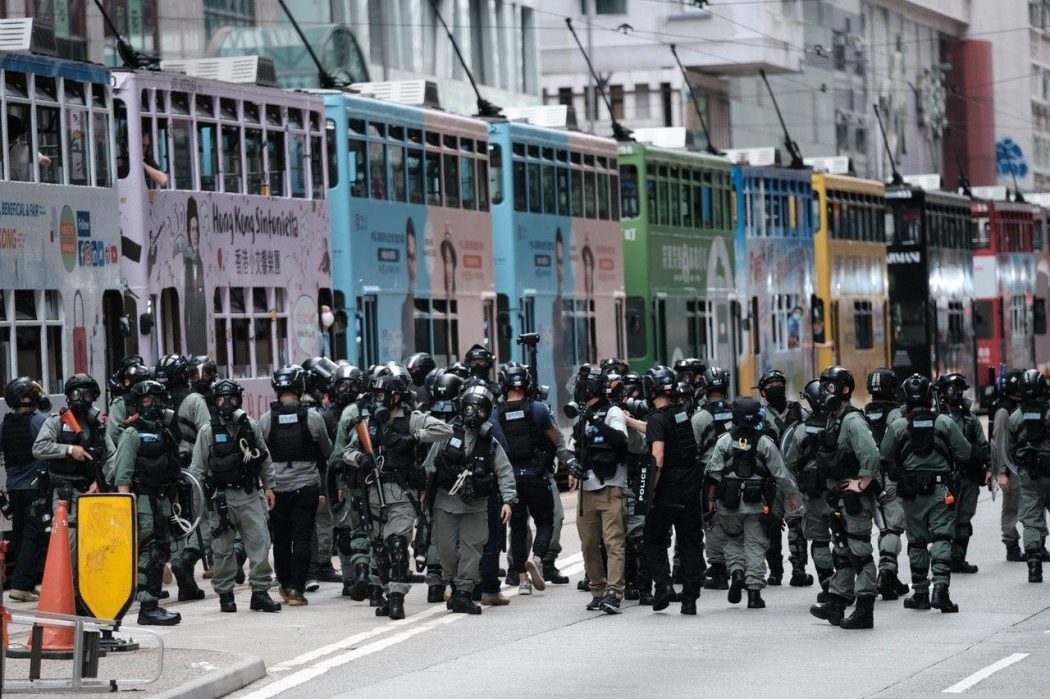In the days when I was sometimes invited to address large groups of police officers about their relations with the press, the recurring complaint which came up was that there was no regulatory body to which complaints about the press could be addressed.
My usual reply, that we would be quite happy to have a complaint arrangement like the police one, did not go down well. The problem clearly continues. Last week the Hong Kong Police Force was reduced to writing a letter containing a series of complaints to the four organisations which, between them, represent most journalists.

This was (I hope this did not come as a surprise) widely reported. So we can console the Force with a response to their gripes which will be at least as forthcoming as their usual response to our gripes about them.
The first complaint was that a woman arrested “on suspicion of illegal assembly” had been “disguised as a reporter”. Apparently she was wearing a press vest. RTHK’s report on the matter could not resist adding at this point that the police did not say why the existence of a non-reporter in a press vest had anything to do with the real reporters to whom their epistle was addressed.
This is a good point. After all police officers have uniform obligations. They are supposed to display their numbers and/or warrant cards, though they often do not. They are not supposed to adorn their uniforms with badges and logos of their own devising, though they often do. Journalists, on the other hand, can wear what they like.

Since the days of the trench coat, notebook and fedora with a press pass tucked into the hatband have long gone, it is very difficult to be “disguised as a journalist”.
And the press vest, handy though it may be, has no formal status at all. We know this because whenever someone complains about journalists being injured when covering street protests, the Force’s response is always that journalists have no special status. Along with first aiders, social workers, human rights observers, and wandering members of the public they are liable to be shot, soaked, or pepper-sprayed at any time they are in the wrong place at the wrong time in one of the Force’s shooting galleries, or streets as we used to call them.
So I’m afraid this complaint must be unsubstantiated.

The next complaint (I quote RTHK) goes like this: “Police also accused some online media of taking close-up shots of protesters’ pamphlets that contained personal information on officers. The force described this as ‘extremely unprofessional’, adding that such shots may breach a court injunction that prevents the doxxing of police officers.”
I deplore the making of unfounded legal threats. Taking a picture of a leaflet is not “doxxing”. Of course “may” is a weasel word. President Trump may win the Nobel Peace Prize. Who knows?
I would also dispute the “unprofessional” label. If you are a reporter who is going to report the existence of a leaflet the least you are expected to do is to take a picture of one. This is not for publication, but as evidence for the truth of your story.
Now for the third complaint, which is in some ways more interesting.
“The police’s next complaint was that online media had ‘glorified’ the behaviour of a man suspected of stabbing a police officer by identifying him as a ‘resident’ who had ‘driven back’ the police during the protests. The force claimed the man was not an ordinary resident but ‘a criminal’ and said it was despicable for the outlet to confuse right and wrong.”
There is a legal point lurking here. Once legal proceedings are imminent it is a serious offence (known technically as contempt of court) for a media outlet to report events in a way which implies that the person or people arrested, or soon to be arrested, are guilty…or innocent, for that matter. For that reason reporters are trained to report alleged offences using neutral language, of which “resident” and “driven back” are examples, and “a criminal” is not.

It is sadly true, as I have been complaining for years, that this rule is often broken. The reason why it is often broken is because the Department of Justice (DoJ), unlike the old colonial Legal Department, does not keep an eye on the news media to spot infringements.
From time to time I have written to the DoJ pointing out conspicuous breaches of the rule. Their polite, but unhelpful, reply is that they only initiate prosecutions on receipt of suggestions from the police. This is unhelpful because the usual origin of prejudicial information is a police source, sometimes informal and sometimes in an official press conference.
As it happens the case of the resident accused of stabbing a police officer provided a good example. Within hours of his arrest it was reported on all channels, citing “police sources”, with a variety of details about the arrest which clearly implied an attempt to flee.
As some media were careless enough to report his name, we must suppose this was among the information supplied. Indeed, as some media managed to interview his family in time for the morning editions we must suppose that his address was supplied as well.

So there you go. While photographing the personal information of a police person is “unprofessional”, leaking the personal information – and some highly prejudicial snippets of evidence – about an arrested suspect is business as usual for police officers.
There are one set of rules for us, and another for them, as readers will no doubt already have deduced from the case of the motorcyclist alleged to have driven into a group of policemen. Initially charged with “furious driving”, he has now also been charged with “terrorism”, apparently for no better reason than that it meant he was denied bail.
Meanwhile, the policeman who drove a motorcycle into a group of protesters was not charged with anything.
